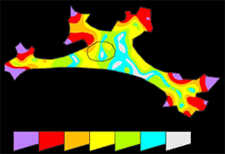Research
The Reinhart-King lab uses tissue engineering, microfabrication, novel biomaterials, model organisms, and tools from cell and molecular biology to study the effects of mechanical and chemical changes in tissues during disease progression. We have projects focused on cancer, diabetes, and cardiovascular disease.
-
During tumor progression, mechanical, chemical and structural changes occur within the extracellular matrix. It is thought that these changes in the microenvironment may promote malignancy and metastasis. To understand how the physical properties of the tumor microenvironment facilitate the escape of metastatic cells from the primary tumor, we create models of the tumor microenvironment using native and synthetic matrices, microfabricated devices, and novel biomaterials. This work will uncover new therapeutic targets designed to prevent metastasis.
-
Recent work has identified glycation due to hyperglycemia as a major contributor to worsened outcomes for diabetic cancer patients. Our work has shown that abnormal hyperglycemia increases the abundance of advanced glycation end-products (AGEs), increases matrix stiffness, and accelerates breast cancer progression in MMTV-PyMT spontaneous tumor forming mice. We are using our in vitro techniques and hyperglycemic mouse models to further investigate the role of AGEs in disease progression.
-
Angiogenesis is the formation of new capillaries from pre-existing ones and is critical to tumor growth. While much is known about the growth factors and associated signaling pathways that trigger and regulate angiogenesis, less is known about the role of mechanical cues in angiogenesis. Our lab has recently demonstrated that changes in the mechanical properties of the extracellular environment can disrupt the formation of newly forming vascular networks. In this project, we use a combination of in vitro and in vivo models to explore how we can control angiogenesis by manipulating the extracellular environment.







